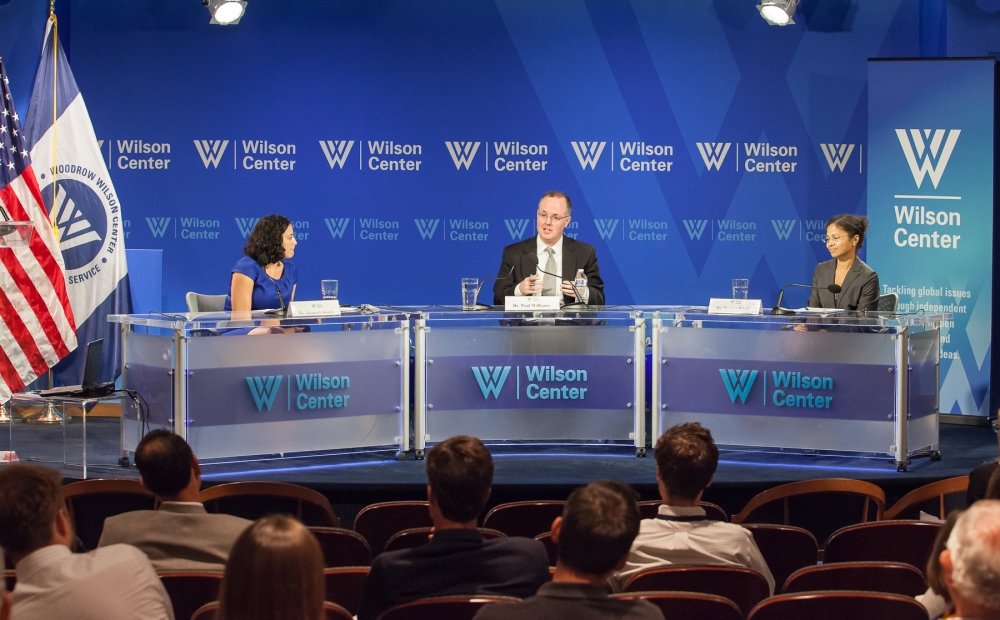Book Launch: War and Conflict in Africa

On Wednesday, September 7th, the Wilson Center Africa Program hosted Wilson Center Global Fellow Dr. Paul Williams, Associate Professor in the Elliott School of International Affairs at the George Washington University, for the launch of the second edition of War and Conflict in Africa. Dr. Williams was joined by Dr. Dorina Bekoe, Associate Professor of Conflict Prevention, Mitigation, and Resolution, African Center for Strategic Studies, National Defense University, who served as a discussant.
Dr. Williams explored the major patterns of organized violence in Africa, highlighting changing trends in violent conflict since the publication of the first edition in 2011. In his taxonomy, wars in Africa fall into two distinct, though overlapping categories: wars involving the state, which revolve around access to state power, and non-state armed conflicts, which are fought at a more localized level and on the margins of the state. Although the vast majority of conflicts in Africa fall into the latter category, there has been a significant increase in state-based violence since 2010, with prominent examples in Nigeria, Libya, Mali, Somalia, the Central African Republic, and South Sudan. As in the first edition, Dr. Williams cautioned against relying on simplistic explanations for conflict and recommended thinking of the causes of conflict as ‘ingredients’ in a recipe, identifying neopatrimonialism, natural resources, sovereignty, and ethnicity and religion as common ingredients in many conflicts. Still, Dr. Williams argued, ultimately the key to starting and stopping wars is governance, and there is no escape from the long, arduous process of reforming authoritarian and poorly governed states. International responses to conflict have evolved since the book’s first edition, with more assertive forms of conflict management in Africa, encompassing peace operations, stabilization, and atrocity prevention. Nonetheless, Dr. Williams emphasized that the international community has little leverage over local actors determined to wage war, and political rather than military tactics are essential to establishing a lasting peace.
Dr. Bekoe further distilled the book’s key arguments about the centrality of governance to conflict, the dangers of seeking peace through power-sharing agreements, and the need to understand the multiple terrains of struggle. The Mo Ibrahim Index of African Governance has shown a stalling in the quality of governance on the continent in recent years, which may help explain the rise in riots and protests across some countries, including those conventionally considered stable, such as Ghana. Dr. Bekoe highlighted that the international community has historically engaged almost exclusively with African political elite, and while there is now a better understanding of the need to engage at multiple levels of society, leveraging the political will and resources to facilitate these deeper connections has remained a challenge for international actors.
This event was live-tweeted and an audio recording of the discussion is available above. Follow the Africa Program on Twitter @AfricaUpClose and catch up on the conversation with the hashtag #conflictinAfrica. For more information about the Africa Program, please see here.
Speakers

Professor of International Affairs and, Associate Director, M.A. Security Policy Studies Program, The George Washington University

Hosted By

Africa Program
The Africa Program works to address the most critical issues facing Africa and US-Africa relations, build mutually beneficial US-Africa relations, and enhance knowledge and understanding about Africa in the United States. The Program achieves its mission through in-depth research and analyses, public discussion, working groups, and briefings that bring together policymakers, practitioners, and subject matter experts to analyze and offer practical options for tackling key challenges in Africa and in US-Africa relations. Read more
